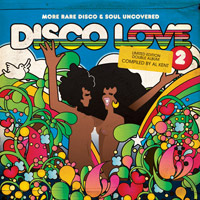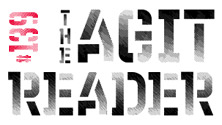
Disco Love 2: More Rare Disco & Soul Uncovered
BBE
Disco gets a bad rap—and probably rightfully so given all the crap that got pressed to wax post–Saturday Night Fever. Even still, as with most genres, there’s both bad and good, horrible and amazing, and it takes a little digging to find the cream of the crop. At least one man is making that his mission, Glasgow native Al Kent, who is responsible for BBE’s Disco Love series.
Kent heads up the Million Dollar Disco production team and hosts a monthly DJ night in his hometown, but he has made a name for himself, not only for his cratedigging abilities, but for the edits he’s created of the jewels he’s unearthed. Disco itself is a hard thing to define, but you know it when you hear it. It’s falls on the musical spectrum somewhere between funk and pop, while incorporating elements from bossanova and elsewhere. In many ways, it’s built on excess, it’s over-the-top production the embodiment of the fashion and drug-take that accompanied the music.
Still, as evidenced by Kent’s curated compilation, there’s plenty of variance within disco’s confines. There’s a world of difference between the horn-punctuated proto-funk of Sonny Carver’s “Love Exchange” and the futuristic sounds of Bill Avery and Love Co’s “Disco Fever,” or the string-accented moody complexion of “Do It with Me” and the flutes and analog synths of the briskly paced “Loosen Up” by Frequency. It all falls under the umbrella of disco, but as you can tell, there’s much more at work here than flashing lights and butterfly collars.
Moreover, it’s doubtful that most ears have heard these tracks. so they aren’t tainted by decades of being overplayed. Google most of these artists and you’ll find very little. Sandy Barber, who contributes the fiery “I Think I’ll Do Some Stepping On My Own,” is probably the best known, if only for contributing the theme to the Wonder Woman television show of the 1970s. Craver ran the Stanson Recording Company out of his home base of Columbus, but never had a big hit. Sonny & Sue were a European duo that had a hit covering “Singing on a Star,” but were otherwise unknown, and the namesake of the Elijah John Group went on to become a member of Instant Funk. But otherwise, there is little information to be had on the artists who cut these sides.
Not that it matters. Aged in Harmony’s “I Feel Like Dancin’” still cuts a deep groove and Nasty City’s “Disco Baby” is a hearty helping of funky sounds. I’m not informed enough to comment on Kent’s edits, but his curation shows an impeccable ear, and that for those in the know, disco is not dead yet.
Stephen Slaybaugh
PAST PERFECTS
Queens of the Stone Age, Queens of the Stone Age
Human Switchboard, Who’s in My Hangar?
Johnny Cash, From Memphis to Hollywood: Bootleg Vol. 2
Miles Davis, Bitches Brew Live
The Witches, A Haunted Person's Guide to...
Fela Kuti, "Power Show" Batch, Part II
Fela Kuti, "Power Show" Batch, Part I
Willie Wright, Telling the Truth
ESG, Dance to the Best of ESG
Sofrito: Tropical Discotheque
Squirrel Bait, Skag Heaven
Nine Inch Nails, Pretty Hate Machine
Orange Juice, Coals to Newcastle
Tom Petty and the Heartbreakers, Damn the Torpedoes
